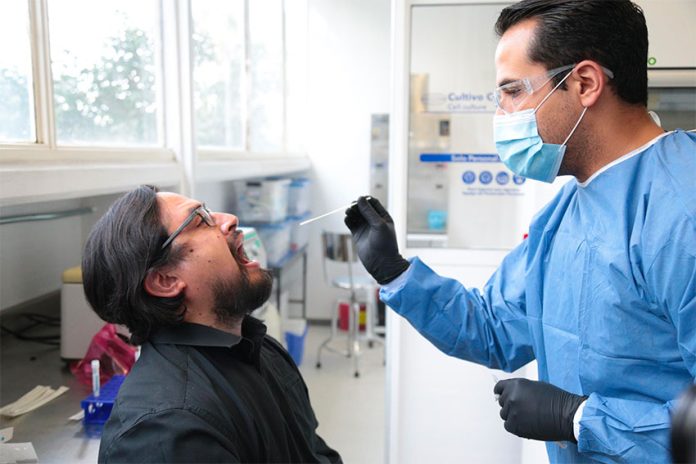An association of private medical laboratories has called on the federal government to crack down on companies and people selling fake Covid-19 test results to international travelers.
The Mexican Council of Medical Diagnosis Companies (Comed) said fake test results are being sold in hotels and airports and called on the health regulator Cofepris to identify and sanction those guilty of the practice.
A negative test result is required to travel to various countries including the United States and Canada.
“Fake test [results] are easily detected and those responsible for issuing them must be sanctioned immediately. People traveling internationally can and must do legal tests performed by authorized and serious laboratories that provide service to airports and hotels,” Comed said.
“… This illegal trafficking [of fake results] only promotes greater spread of the virus at the time of a serious health emergency and the appearance of new variants of SARS-CoV-2.”
Comed also called on the government to work with social media companies to identify people selling and buying fake Covid-test results online.
Daniel Uribe, CEO of GenoBank.io, a company that provides secure digital wallets to store DNA data, told the newspaper El Universal that security features on Covid test results issued by the government and authorized labs should be increased to avoid falsification.
He said test results should have QR codes that allow them to be certified, explaining that would avoid fraud by phony laboratories and everyday citizens won’t be able to falsify results.
“There are people who sell tests with false negatives, that’s why it’s important … to improve security features on the results of diagnostic tests,” Uribe said.
He also said that unreliable Covid-19 testing kits that are sold on the black market are a concern in both Mexico and the United States.
Guillermo Máynez Gil, general director of Comed, said that eight laboratories are already using blockchain technology to ensure that their Covid tests results are not vulnerable to falsification or other illegal practices.

There are 129 laboratories, hospitals and research centers with federal government authorization to conduct Covid tests but there is a lack of effective regulation of testing in Mexico.
El Universal reported that there are no standardized testing controls in Mexico’s main tourism destinations.
“The airports and hotels chose the laboratories with which they work and in all cases it’s said they are certified by health authorities; However, there is not a regulator at a national level that supervises the … tests that are applied to tourists,” said the newspaper, which spoke with authorities in Oaxaca city, Los Cabos, Puerto Vallarta and Acapulco
It noted that a laboratory in Cancún where a group of Argentine tourists were supposedly tested was shut down by Quintana Roo authorities on Thursday. Many of the tourists tested positive for Covid in Argentina after traveling home with negative Covid results provided by the now-shuttered lab.
Deputy Health Minister Hugo López-Gatell said Monday that the lab, Marbu Salud, wasn’t authorized to perform Covid tests.
El Universal said that about 80 hotels in Los Cabos have their own testing stations where antigen rapid tests are performed whereas tourists in Oaxaca city that need a negative Covid test result in order to travel home have to seek out a testing location on their own.
However, there is no official list of authorized labs in Oaxaca where foreigners can get tested, the newspaper said.
Lilzi Orcí, president of the Los Cabos Hotel Association, said hotels in that destination are working with authorized labs, noting that international guests are normally tested two days before their return flights. El Universal was not able to verify Orcí’s claims that the hotels are working with authorized labs.
In Puerto Vallarta, 16 hotels offer free antigen testing and 32 offer antigen and PCR testing at a special price, El Universal said. That city’s tourism trust has also published a list of authorized Covid testing providers.
Covid-19 tests are also performed by authorized providers at many airports across the country including those located in Oaxaca, Los Cabos, Puerto Vallarta, Acapulco and Mexico City.
Source: El Universal (sp)
